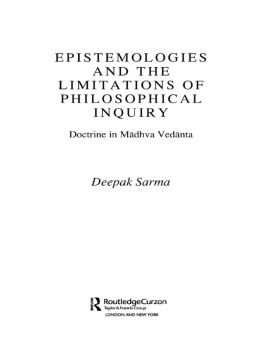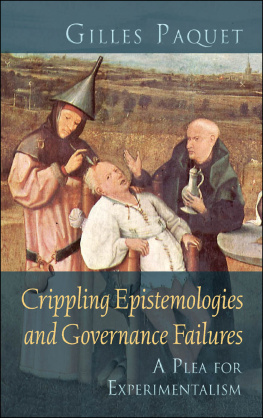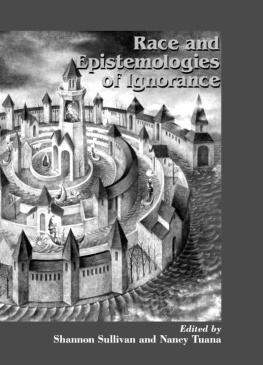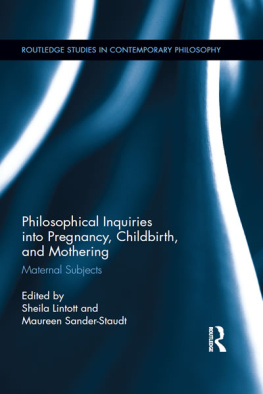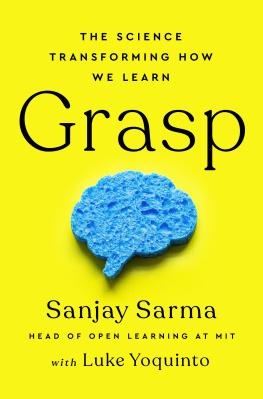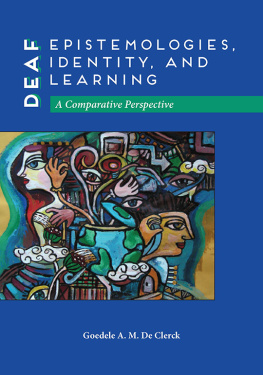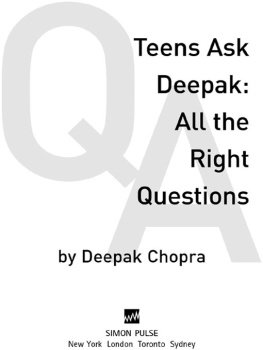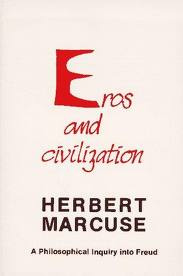DEEPAK SARMA - Epistemologies and the Limitations of Philosophical Inquiry
Here you can read online DEEPAK SARMA - Epistemologies and the Limitations of Philosophical Inquiry full text of the book (entire story) in english for free. Download pdf and epub, get meaning, cover and reviews about this ebook. year: 2011, publisher: Taylor & Francis (CAM), genre: Religion. Description of the work, (preface) as well as reviews are available. Best literature library LitArk.com created for fans of good reading and offers a wide selection of genres:
Romance novel
Science fiction
Adventure
Detective
Science
History
Home and family
Prose
Art
Politics
Computer
Non-fiction
Religion
Business
Children
Humor
Choose a favorite category and find really read worthwhile books. Enjoy immersion in the world of imagination, feel the emotions of the characters or learn something new for yourself, make an fascinating discovery.
- Book:Epistemologies and the Limitations of Philosophical Inquiry
- Author:
- Publisher:Taylor & Francis (CAM)
- Genre:
- Year:2011
- Rating:5 / 5
- Favourites:Add to favourites
- Your mark:
- 100
- 1
- 2
- 3
- 4
- 5
Epistemologies and the Limitations of Philosophical Inquiry: summary, description and annotation
We offer to read an annotation, description, summary or preface (depends on what the author of the book "Epistemologies and the Limitations of Philosophical Inquiry" wrote himself). If you haven't found the necessary information about the book — write in the comments, we will try to find it.
DEEPAK SARMA: author's other books
Who wrote Epistemologies and the Limitations of Philosophical Inquiry? Find out the surname, the name of the author of the book and a list of all author's works by series.
Epistemologies and the Limitations of Philosophical Inquiry — read online for free the complete book (whole text) full work
Below is the text of the book, divided by pages. System saving the place of the last page read, allows you to conveniently read the book "Epistemologies and the Limitations of Philosophical Inquiry" online for free, without having to search again every time where you left off. Put a bookmark, and you can go to the page where you finished reading at any time.
Font size:
Interval:
Bookmark:

This book breaks new ground in at least two ways, both of them important. The first is that it treats the epistemology of the Mdhva school of Vedanta, and in doing so explains the essential philosophical commitments of that tradition. The second is that it wittily and pointedly develops the insider/outsider questions: Can a tradition that forbids study of its classical texts to the uninitiated be the subject of scholarly interpretation by western scholars who lack such initiation? How is such a traditions self-understanding changed by new technologies of communication and by increasing pressure from western scholars with money and resources who would like to study it? Mdhva Vedanta, in Sarmas expert hands, is shown both to question the western scholarly establishment, and to be questioned by it.
Paul J. Griffiths, Schmitt Professor of Catholic Studies,
University of Illinois at Chicago
Sarmas book is an accessible and highly readable discussion of the insideroutsider debate. His own personal experience in exploring the issue of membership in this context is insightful and engaging.
Richard King, Lecturer in Religious Studies, University of Stirling
Do you have to be one to know one? Madhvcrya, the founder of the thirteenth century school of Vednta, answered this question with a resounding yes! Madhvcryas insistence that one must be a Mdhva to study Mdhva Vednta led him to employ various strategies to exclude outsiders and unauthorized readers from accessing the root texts of his tradition and from obtaining oral commentary from living virtuosos. In this book Deepak Sarma explores the degree to which outsiders can understand and interpret the doctrine of the Mdhva school of Vednta. The school is based on insider epistemology, which is so restrictive that few can learn its intricate doctrines. Revealing the complexity of studying traditions based on insider epistemologies, this book encourages its audience to ponder both the value and the hazards of granting any outsider the authority and opportunity to derive important insights into a tradition as an insider. This work contributes to the ongoing controversies regarding epistemic authority and voice in religious studies.
Deepak Sarma is an Assistant Professor of Religious Studies at Case Western Reserve University.
Series Editor: Francis X. Clooney, SJ

The RoutledgeCurzon Hindu Studies Series, in association with the Oxford Centre for Hindu Studies, intends primarily the publication of constuctive Hindu theological, philosophical and ethical projects aimed at bringing Hindu traditions into dialogue with contemporary trends in scholarship and contemporary society, and with the particular concerns of Hindus living in India and abroad today. The series also invites proposals for annotated translations on important primary sources and studies in the history of the Hindu religious traditions.
EPISTEMOLOGIES AND THE LIMITATIONS OF PHILOSOPHICAL INQUIRY
Doctrine in Mdhva Vednta
Deepak Sarma
A HINDU CRITIQUE OF BUDDHIST EPISTEMOLOGY
Kumarila on Perception
The Determination of Perception Chapter of Kumarilabhattas
Slokarvarttika
Translation and Commentary
John Taber

LONDON AND NEW YORK
First published 2005
by RoutledgeCurzon
2 Park Square, Milton Park, Abingdon, Oxon OX14 4RN
Simultaneously published in the USA and Canada
by RoutledgeCurzon
270 Madison Ave, New York, NY 10016
This edition published in the Taylor & Francis e-Library, 2005.
To purchase your own copy of this or any of Taylor & Francis or Routledges collection of thousands of eBooks please go to www.eBookstore.tandf.co.uk.
RoutledgeCurzon is an imprint of the Taylor & Francis Group
2005 Deepak Sarma
All rights reserved. No part of this book may be reprinted or reproduced or utilized in any form or by any electronic, mechanical, or other means, now known of hereafter invented, including photocopying and recording, or in any information storage or retrieval system, without permission in writing from the publishers.
British Library Cataloguing in Publication Data
A catalogue record for this book is available from the British Library
Library of Congress Cataloging in Publication Data
A catalog record for this book has been requested
ISBN 0-203-48813-X Master e-book ISBN
ISBN 0-203-34114-7 (Adobe eReader Format)
ISBN 0-415-30805-4 (Print edition)
O
nryao gayaguanityaikanilaykti |
aeadoarahitapryat kamallaya |
Madhvcrya, Updhikhaana, 1
namo mandanijnandasndrasundaramrtaye |
indirpataye nitynandabhojanadyine |
Madhvcrya, Updhikhaana, 19
In service of Lord Ka and the Mdhva Sapradya.
O
The RoutledgeCurzon Hindu Series, published in collaboration with the Oxford Centre for Hindu Studies, primarily intends to focus on the publication of constructive Hindu theological, philosophical, and ethical projects. The focus is on issues and concerns of relevance to readers interested in Hindu traditions and a wider range of related religious concerns that matter in todays world. The series seeks to promote excellent scholarship and, in relation to it, an open and critical conversation among scholars and the wider audience of interested readers. Though contemporary in focus, however, the series also recognizes the importance of a contemporary retrieval of the classic tests and ideas, beliefs and practices, of Hindu traditions. One of its goals, then, is the promotion of fresh conversations about what mattered traditionally.
We are therefore delighted to publish as our first book Deepak Sarmas Epistemologies and the Limitations of Philosophical Inquiry, a book that addresses conceptual issues of broad contemporary importance, yet in light of specific traditional materials and with deep respect for a traditional religious community largely outside the world of Western academe. Epistemologies focuses on the rich and fascinating Mdhva Vednta tradition, an old, long-established, yet still vital religious tradition that unfortunately has often lay in the shadows, seemingly last and least in a trio of Sankara, Ramanuja, and Mdhva Vednta.
Sarma skillfully provides a needed introduction to this religious and theological tradition of devotion to Visnu in its medieval south Indian context. He then brings this information into recognized and urgent contemporary debates about the requirements for reliable insider knowledge and the array of factors that make true understanding of the other difficult or even impossible. On many issues this community stands in continuity with other and earlier Vednta schools, but it offers a particularly strong case for exclusive communal identity, with habits and reasons to the effect that outsiders born elsewhere, educated in the wrong way, belonging to other religious traditions cannot grasp the truths of Vednta accurately and to good effect.
Font size:
Interval:
Bookmark:
Similar books «Epistemologies and the Limitations of Philosophical Inquiry»
Look at similar books to Epistemologies and the Limitations of Philosophical Inquiry. We have selected literature similar in name and meaning in the hope of providing readers with more options to find new, interesting, not yet read works.
Discussion, reviews of the book Epistemologies and the Limitations of Philosophical Inquiry and just readers' own opinions. Leave your comments, write what you think about the work, its meaning or the main characters. Specify what exactly you liked and what you didn't like, and why you think so.

